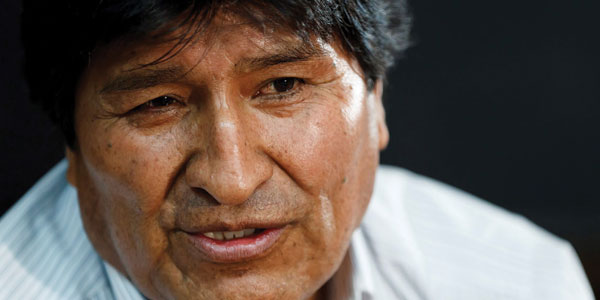
“Why are presidents so eager to hold on to power forever? Why is Evo Morales so convinced that no one else but him can do the job?”
— Elena Poniatowska, Nov. 9, 2019
The story behind Evo Morales’ resignation as Bolivia’s president is a complicated one. Sure, there was a popular uprising following a foolishly rigged election on Oct. 20. But it’s also true that Morales was forced to resign in part because the military expressly wanted him to.
There was fraud and there was a coup. Both happened.
In the end, Morales was undone by his unquenchable desire for power. He legally won the 2005 election — becoming the first president of indigenous origin in Bolivia’s modern history — after which he headed up efforts to reform the constitution. He then won the next presidential election in 2009, and that’s when the cheating began. Morales argued that his first term didn’t really count, which allowed him to run for (and win) a third term in the 2014 election.
As if holding on to power until 2020 weren’t enough for Morales, in 2016 he held a referendum on a measure that would allow him to run for a fourth term — only this time he lost. The Bolivian people voted to ban him from ever running for president again. However, being a sore loser, Morales argued that the referendum decision violated his rights. And the nation’s constitutional court (controlled by his allies) ruled in his favor: Morales was entitled to run for president as many times as he wanted.
This cleared the way for Morales to run yet again last month. After a highly suspicious 24-hour pause in updates to the vote count, the Supreme Electoral Tribunal (also controlled by Morales’ allies) declared him the winner of the first round, allowing him to remain in office. The fraud seemed all too obvious.
A team of auditors sent by the Organization of American States found that there had been “manipulations of the computer system,” “falsified signatures and alterations” and “inconsistencies with the number of people casting their votes.” As a result, the OAS declared that it could not verify the election results.
According to Morales’ political opposition, a fraud of this size couldn’t have occurred without the knowledge of both Morales and the electoral tribunal, the agency responsible for overseeing the vote. This led to more than 20 days of protests. Feeling cornered, Morales offered to meet with the opposition, and even call new elections. But it was too late.
Soldiers broke ranks and refused to crack down on street protesters. Then the commander in chief of the armed forces went on national television and said the following: “We encourage the president to resign his office.”
Carlos Mesa, a former Bolivian president and Morales’ chief rival in last month’s election, told me in an interview that the “phrasing wasn’t good.” But it was even worse than that. If the military — of any nation — publicly encourages the president to resign, that suggestion can easily be interpreted as a coup attempt.
This statement by the Bolivian military broke with the constitutional order, even if many of the president’s rivals, including Mesa, considered Morales to be an illegitimate president. This was a coup against a leader who, according to the opposition, had violated the law several times in order to seek reelection indefinitely.
Some people have said that Morales was in a similar position to that of Chancellor Angela Merkel, who has led Germany for 14 years. Merkel rose to power in 2005, the same year that Morales won his first election. But there are significant differences between the two leaders: Merkel has not attempted to change her nation’s constitution whenever she pleases, nor has she committed fraud to remain in power.
As I said, it’s complicated. There was a coup, yes, but it was against a president responsible for electoral fraud and other misdeeds.
Although Morales has fled Bolivia, the stability of the country’s democracy remains a cause for concern. On Nov. 11, Mexico granted asylum to Morales after he requested it. I applaud Mexico’s tradition of granting political asylum to those in need: Our country welcomed thousands of Spanish exiles during the civil war, and we’ve welcomed Argentines and Chileans fleeing tyranny. But the administration of Andrés Manuel López Obrador (or AMLO, as he’s known) can no longer maintain a neutral position on foreign policy.
Whenever he is asked about the dictatorship in Venezuela, López Obrador usually replies that he is neither “in favor nor against it,” because he stands by Mexico’s nonintervention policy. But AMLO has clearly felt free to meddle in Bolivia’s domestic affairs: first by congratulating Morales on his “victory,” then by denouncing a “coup” in the country and now by opening Mexico’s doors to a man considered by many to be an undemocratic leader. If López Obrador is so worried about democracy, why hasn’t he denounced the dictatorships in Cuba, Venezuela and Nicaragua?
Let’s be clear: Mexico has nothing to learn about democracy from Morales. The way he cheated to hold on to power is reminiscent of the worst times of the Institutional Revolutionary Party, which ruled Mexico for 70 consecutive years.
Morales may be many things, but a democratic role model certainly isn’t one of them.
Evo, el fraude y el golpe
“¿Por qué los presidentes de la república quieren eternizarse en el poder? ¿Por qué insiste Evo Morales en creer que no hay nadie más que él?”
— Elena Poniatowska, 9 de noviembre, 2019
La historia de la salida del poder de Evo Morales es complicada. Sin duda hubo una rebelión popular ante el vergonzoso y torpe fraude electoral del 20 de octubre. Pero también es cierto que la explícita presión de los militares obligó a Morales a dejar la presidencia.
Hubo fraude y hubo golpe. Las dos cosas.
Evo Morales cayó, fundamentalmente, por su incontrolable deseo de permanecer en el poder. Estos son los datos. Ganó legítimamente las elecciones de 2005 —y se convirtió en el primer presidente indígena en la historia moderna de Bolivia—, y después lideró un esfuerzo para cambiar la constitución. Volvió a ganar unas elecciones en 2009, pero ahí empezaron las trampas. Dijo que su primer período presidencial no contaba y eso le permitió buscar (y ganar) una segunda reelección en 2014.
No contento con quedarse en el poder hasta 2020, organizó un referéndum en 2016 para buscar otra reelección y, en esa ocasión, perdió. El resultado del plebiscito le prohibía lanzarse una vez más a la presidencia. Pero, mal perdedor, él aseguró que eso violaba sus derechos. Recurrió al Tribunal Constitucional —controlado por sus partidarios— y logró un dictamen que le permitiría reelegirse todas las veces que quisiera. Otra trampa.
Eso nos lleva a las elecciones de octubre de 2019, en las que Evo buscaba un cuarto mandato presidencial. Tras una extrañísima caída del sistema por varias horas, el Tribunal Supremo Electoral (TSE) —también dominado por Morales— lo declaró ganador en la primera vuelta. Pero el fraude parecía obvio.
Un equipo auditor de la Organización de los Estados Americanos (OEA) determinó que hubo “manipulaciones al sistema informático”, “alteraciones y firmas falsificadas”, “inconsistencias con el número de ciudadanos que sufragaron” y, por lo tanto, “no puede validar los resultados de la presente elección”.
Ese fraude no pudo haber ocurrido, según la oposición, sin la complicidad de Morales y el TSE —el ente encargado de organizar las votaciones—. Esto generó más de veinte días de protestas. Evo, arrinconado, ofreció un diálogo con sus opositores e, incluso, la realización de nuevas elecciones. Pero ya era demasiado tarde.
En las calles bolivianas, muchos militares se rehusaban a reprimir a los manifestantes. Y fue entonces que el comandante en jefe de las Fuerzas Armadas, en televisión nacional, anunció: “Sugerimos al presidente del Estado que renuncie a su mandato presidencial”. Carlos Mesa, exmandatario y candidato presidencial, me dijo en una entrevista que se trató de una “frase que no fue afortunada”. Pero fue más que eso. Si los militares, en cualquier parte del mundo, le sugieren a un presidente que renuncie, eso sería interpretado como un intento de golpe de Estado. Y en Bolivia también.
Esa “sugerencia” de los militares bolivianos rompió el orden constitucional reinante a pesar de que muchos opositores, como Mesa, consideraban que Evo Morales era un presidente ilegítimo. Se llevó a cabo un golpe de Estado en contra de un líder que, según la oposición, había violado la ley en varias ocasiones para buscar la reelección indefinida.
Algunos han comparado la situación de Morales con la de la canciller alemana, Angela Merkel, quien lleva catorce años al frente de su país. Casi en paralelo con Evo, Merkel llegó al poder en 2005, pero hay diferencias sustanciales entre ambos: la canciller no cambió la constitución a su gusto ni hizo un burdo fraude para prolongar su liderazgo.
Se los dije: es complicado. Hubo un golpe contra el responsable de un fraude electoral y varios trucos más.
Evo puede ser muchas cosas, pero no un ejemplo de democracia.









